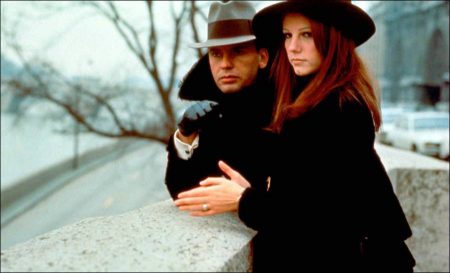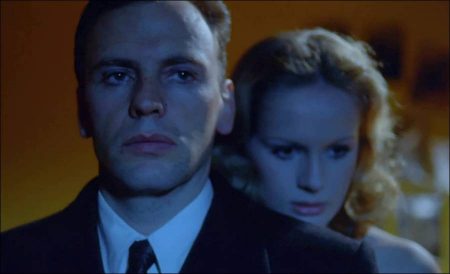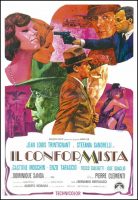The Conformist opens in 1938 in Rome, where Marcello has just taken a job working for Mussollini and is courting a beautiful young woman who will make him even more of a conformist. Marcello is going to Paris on his honeymoon and his bosses have an assignment for him there.
Look up an old professor who fled Italy when the fascists came into power. At the border of Italy and France, where Marcello and his bride have to change trains, his bosses give him a gun with a silencer. In a flashback to 1917, we learn why sex and violence are linked in Marcello’s mind.
The Conformist (Italian: Il Conformista) is a 1970 political drama film directed by Bernardo Bertolucci, whose screenplay is based on the 1951 novel The Conformist by Alberto Moravia. The film stars Jean-Louis Trintignant, Stefania Sandrelli, Gastone Moschin, Enzo Tarascio, Fosco Giachetti, José Quaglio, Dominique Sanda and Pierre Clémenti. The film was a co-production of Italian, French, and West German film companies. Bertolucci makes use of the 1930s art and decor associated with the Fascist era: the middle-class drawing rooms and the huge halls of the ruling elite.
About the Story
In Paris, Marcello Clerici finalizes his preparations in assassinating his former college professor, Luca Quadri. It frequently returns to the interior of a car driven by Manganiello as the two of them pursue the professor and his wife.
Through a series of flashbacks, he is seen discussing with his blind friend Italo his plans to marry, his somewhat awkward attempts to join the Fascist secret police, and his visits to his parents: a morphine-addicted mother at the family’s decaying villa, and his unhinged father at an insane asylum.
In another flashback, Marcello is seen as a boy during World War I, who finds himself in his family’s wealth. He is humiliated by his schoolmates until he is rescued by Lino, a chauffeur. Lino offers to show him a pistol and then makes sexual advances towards Marcello, which he partially responds to before grabbing the pistol and shooting wildly into the walls and into Lino, then flees from the scene of what he assumes is a murder.
In another flashback, Marcello and his fiancée Giulia discuss the necessity of his going to confession, even though he is an atheist, in order for her Roman Catholic parents to allow them to marry. Marcello agrees and, in confession, admits to the priest to have committed many grave sins, including his homosexual intercourse with and subsequent murder of Lino, premarital sex, and his absence of guilt for these sins.
Marcello admits he thinks little of his new wife but craves the normality that a traditional marriage with children will bring. The priest is shocked — and pruriently interested in Marcello’s homosexual experience — but quickly absolves Marcello once he hears that he is currently working for the Fascist secret police, called Organization for Vigilance and Repression of Anti-Fascism.
Marcello finds himself ordered to assassinate his old acquaintance and teacher, Professor Quadri, an outspoken anti-Fascist intellectual now living in exile in France. Using his honeymoon as a convenient cover, he takes Giulia to Paris where he can carry out the mission.
While visiting Quadri he falls in love with Anna, the professor’s young wife, and pursues her. Although it becomes clear that she and her husband are aware of Marcello’s Fascist sympathies and the danger he presents to them, she responds to his advances, as well as forming a close attachment to Giulia, towards whom she also makes sexual advances.
Giulia and Anna dress extravagantly and go to a dance hall with their husbands where Marcello’s commitment to the fascists is tested by Quadri. Manganiello is also at the dance hall, having been following Marcello for some time and doubtful of his intentions. Marcello secretly returns the gun that he has been given and gives Manganiello the location of Quadri’s country house where the couple plan to go the following day.
The Conformist (1970)
Directed by: Bernardo Bertolucci
Starring: Jean Louis Trintignant, Stefania Sandrelli, Gastone Moschin, Dominique Sanda, Pierre Clémenti, Luciano Rossi, Massimo Sarchielli, Umberto Silvestri, Orso Maria Guerrini
Screenplay by: Bernardo Bertolucci
Production Design by: Ferdinando Scarfiotti
Cinematography by: Vittorio Storaro
Film Editing by: Franco Arcalli
Costume Design by: Gitt Magrini
Set Decoration by: Maria Paola Maino
Art Direction by: Ferdinando Scarfiotti
Music by: Georges Delerue
MPAA Rating: None.
Distributed by: Paramount Pictures
Release Date: October 22, 1970 (Italy and United States)
Views: 308


